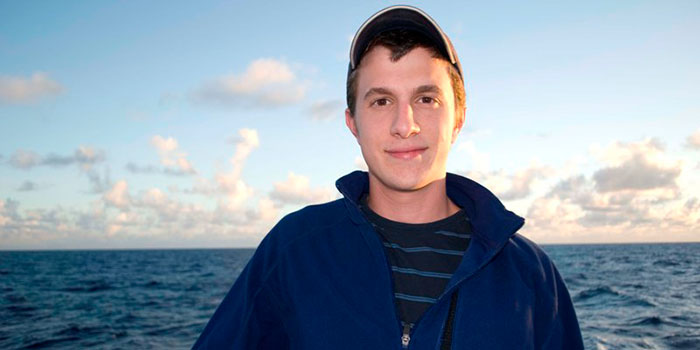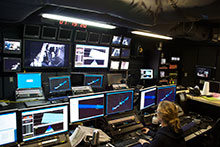
Meet Jack Payette
Jack Payette is an Explorer-in-Training who has sailed on the NOAA Ship Okeanos Explorer multiple times, learning about and assisting in activities to map the seafloor. Read the full text of Jack's interview below to learn more about his experiences on the ship.
About Jack's Role
What were your duties?
I sailed aboard the NOAA Ship Okeanos Explorer, acquiring and collecting multibeam sonar data, while working directly with the ship’s operations officer and mapping technician. Maintaining the science mapping log and performing preliminary data processing were additional parts of my daily activities. My duties also included the deployment of Sippican XBT (temperature and depth) probes for the collection of sound velocity profiles (SVPs) used to correct sonar data for changes in sound speed in the water column.
In 2009, I sailed on a cruise in the Hawaiian Islands, mapping a feature known as Necker Ridge, during the early stages of the mapping Explorer-in-Training program. In 2010, I sailed on a transit mapping cruise from Guam to Hawaii, when the Okeanos Explorer was returning to U.S. waters after three months in Indonesia.
Which school are you attending?
I attended the University of New Hampshire (UNH) College of Engineering and Physical Sciences for my undergraduate studies, where I majored in Earth Sciences with a concentration in Oceanography. My favorite coursework at UNH was in marine microbiology and chemical oceanography; I also participated in a NAUI SCUBA diving certification program at UNH.
Currently I’m in the process of enrolling in the University of Rhode Island’s Graduate School of Oceanography for a master’s degree in Oceanography. I’m looking to pursue research in paleoceanography, biogeochemistry, and marine microbiology.
Where was your work experience located? If you were working at sea, what were your impressions of living and working on a ship?
My first NOAA cruise in 2009 sailed out of Honolulu, Hawaii. The Okeanos Explorer was docked at the Ford Island Navy Base in Pearl Harbor, Oahu, Hawaii, which was a unique and beautiful location to visit and work from. We sailed (or rather steamed) a specific course westward along the Hawaiian islands chain, ultimately in order to acquire sonar data for mapping over and around a feature on the seafloor known as Necker Ridge.
This was honestly an eye-opening experience. I found that I loved being far out at sea, despite the difficult conditions and challenges that come along with it. Sea sickness, lack of sleep, limited personal space, and many other restrictions or limitations were not a problem at all for me – waking up to beautiful sunrises (or sunsets) and being surrounded on all sides by clear blue water was more than worth the hard work and risk. Having past experience on the water, sailing and lifeguarding skills were very useful and important in this unique situation of working and living in the open ocean. If I wasn’t around such great people and had such a positive (not to mention exciting) first experience, I probably wouldn’t have been able to participate in seven more oceanographic cruises over the next few years.
In 2010, I was delighted to get an email from Meme Lobecker, the NOAA Physical Scientist leading the mapping operations aboard the Okeanos Explorer, saying that there was an opportunity for me to participate in another cruise. This expedition was a mapping cruise during the ship’s transit back from Piti, Guam (on the way back from Indonesia) to Ford Island in Hawaii. It was very exciting to fly out to Guam from Boston and experience Guam’s unique South Pacific culture and customs. Seeing the changes and how much the ship, its crew, scientists, and program had advanced since 2009 was wonderful.
Sailing into Hawaii and visiting Oahu again and also visiting the big island of Hawaii itself for the first time were unique experiences that I won’t soon forget. Being able to live and work aboard the Okeanos Explorer for a second time meant that I was able to continue to build upon the existing relationships with the NOAA officers and crew, in addition to the other experience I had gained aboard four other cruises I had participated in. After completing this second cruise, I wrote a brief blog post about my experiences.

Jack Payette's "office" during his time on the Okeanos Explorer.
What sparked your initial interest in ocean sciences?
I have always been interested in marine science since I’ve been young, spending summers on Cape Cod in Massachusetts. I’ve grown up with a very strong interest in natural history, zoology, and marine biology, which my family, teachers, and friends have all helped nurture and develop. During high school, I took classes in biology and participated in science fairs. While studying at UNH, I started to take courses in the Earth Sciences department, one of which was ‘Introduction to Oceanography’ which fueled my interests in oceanography, other related ocean science coursework, and finally my decision to major in Earth Sciences and concentrate in Oceanography. I have always been someone who loves water and have been consistently drawn to marine science, initially as an interest, then later as a student, and now as someone pursuing graduate studies and a career in ocean sciences.
What was the most personally rewarding part of your experience?
The experience I developed and the connections I made with other researchers, technicians, crewmembers, and scientists were the most rewarding parts of my work experience with NOAA. Being able to participate in exploration and mapping work was a significant accomplishment, especially considering I had just graduated from college and didn’t have significant experience in fieldwork yet. The people and connections have been truly amazing and were by far the most important and rewarding parts of my experience. I really can’t say enough great things about everyone I have worked with aboard the Okeanos Explorer, at NOAA, and the Office of Ocean Exploration and Research. I’m still in touch with many of those colleagues and they are constantly a valuable source of support and guidance for me.
What is the most unexpected thing you have learned?
I’ve learned how much personality and relationships have an impact on one’s work life, in the lab, office, or field, and this was something unique and somewhat unexpected that I discovered while participating in this work experience. From past experience in challenging situations, I know that people’s attitudes and outlooks are of utmost importance, but this was reinforced again while spending time at sea. Having positive crewmembers and helpful, good-natured colleagues makes all the difference and is something you can’t be without when conducting work in the field and out at sea.
Please describe your final project.
Although there were no formal final projects to be completed, I did submit a final questionnaire document which was used to help develop and refine the program during its early stages. I also created a presentation after my first cruise for my own purposes in documenting my work. It’s important to note that I did assist the mapping technicians aboard the Okeanos Explorer in the creation and compilation of their final cruise reports, preliminary mapping products, and processed data. Producing some preliminary mapping products was actually one of our group goals for the second cruise I sailed on. These maps and bathymetric images were included in the cruise report submitted by the operations officer and mapping technician crew, as part of their final work for the cruise. The reports and data now reside in the NOAA national archives.
How do you see this experience fitting in with your future career plans?
This was the first position I was able to obtain on an open ocean exploration or research cruise. This first NOAA cruise was instrumental in actually obtaining a position on the seven other subsequent NOAA and University National Oceanographic Laboratory System (UNOLS) cruises I participated in.
The initial Okeanos Explorer cruise not only propelled me into other oceanographic research projects, cruises, and field work, but also helped to solidify my career plans to work and study more in the marine or ocean sciences. This experience was crucial to improving my understanding about careers in ocean science – it exposed me to the many different career tracks in government and the private sector. I’ve stayed in touch with all the crew, scientists, and personnel I worked with on these cruises who have been invaluable references, mentors, and sources of information and support.
Letter from Jack Payette to Colleagues at the NOAA Office of Ocean Exploration & Research
January 8, 2013
Dear Catalina, Mashkoor, Meme, and Brian –
I am writing to thank all of you for your support and to express my appreciation for being able to participate in the EX program. I am just now finalizing my application to URI's GSO for a master's degree in oceanography starting in the fall. I'm looking to study microbial oceanography, paleoceanography, and biogeochemical cycles.
Catalina, it was great to see you and Brian at the GSO this past December. I feel so proud of how far the EX program has come. The NOAA Ocean Explorer center at URI looks great, too. I've now seen the control rooms at UNH, URI, and on the EX itself! Also, thanks again for all your support in writing me letters of recommendation for my graduate school applications in 2009.
Meme and Brian, it was great cruising with you both. I'm wishing you all the best in your future endeavors and I hope our paths cross again!
Mashkoor, to you I owe the most thanks – for all your support and giving me the opportunity to participate in your research and the EX mapping program when it was just getting started. EX0909 (Necker Ridge Leg 2) was my very first oceanographic research cruise, which started my post-graduate "spree" of participating in oceanographic research cruises. This experience is the single most important reason I am now seeking a master's degree in oceanography. I just wanted to reiterate my sincere appreciation for all your support and the wonderful opportunity you gave me.
Wishing you all the best in 2013 – Do stay in touch!
Warm regards,
Jack Payette